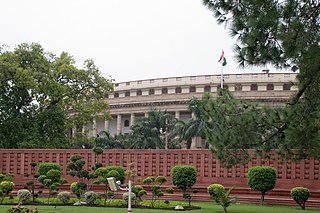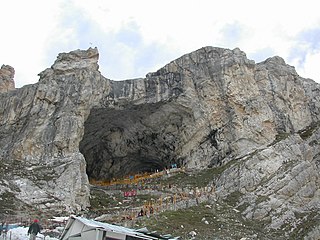Related Research Articles

Lashkar-e-Taiba is a Pakistan-based militant Islamist Salafi jihadist organisation. Described as one of Pakistan's "most powerful jihadi groups", it is most infamous outside Pakistan. The organisation's primary stated objective is to merge the whole of Kashmir with Pakistan. It was founded in 1985-6 by Hafiz Saeed, Zafar Iqbal Shehbaz Abdullah Azzam and several other Islamist mujahideen with funding from Osama bin Laden during the Soviet–Afghan War. It has been designated a terrorist group by numerous countries.

The insurgency in Jammu and Kashmir, also known as the Kashmir insurgency, is an ongoing separatist militant insurgency against the Indian administration in Jammu and Kashmir, a territory constituting the southwestern portion of the larger geographical region of Kashmir, which has been the subject of a territorial dispute between India and Pakistan since 1947.

Doda district is an administrative district of the Jammu division of Indian-administered Jammu and Kashmir in the disputed Kashmir region.

The 2001 Indian Parliament attack was a terrorist attack on the Parliament of India in New Delhi, India on 13 December 2001. The attack was carried out by five armed assailants that resulted in the deaths of six Delhi Police personnel, two Parliament Security Service personnel, and a gardener. All the five terrorists were killed by security forces.
The Kaluchak Massacre was a terrorist attack on 14 May 2002 near the town of Kaluchak in the Indian state Jammu and Kashmir. Three militants attacked a Himachal Road Transport Corporation bus from the Indian state of Himachal Pradesh from Manali to Jammu and killed 7 people. After that they entered the family quarter of the Army and fired indiscriminately at the inmates, killing 23 persons, including 10 children, eight women and five Army men. The age of the children killed ranged from four to 10 years. Thirty-four people were injured in the attack.

The 2000 Amarnath pilgrimage attack on 1 and 2 August was the massacre of at least 89 to 105 people and injury to at least 62 people, in at least five different coordinated attacks by Islamist militants in Anantnag district and Doda district of Indian administered Kashmir.
The 2002 Qasim Nagar massacre was the killing of 29 Hindu labourers in Qasim Nagar on the outskirts of Jammu city in the erstwhile Indian state of Jammu and Kashmir by militants
Pakistan and state-sponsored terrorism refers to the involvement of Pakistan in terrorism through the backing of various designated terrorist organizations. Pakistan has been frequently accused by various countries, including its neighbours Afghanistan, Iran, and India, as well as by the United States, the United Kingdom, Germany, and France, of involvement in a variety of terrorist activities in both its local region of South Asia and beyond. Pakistan's northwestern tribal regions along the Afghanistan–Pakistan border have been described as an effective safe haven for terrorists by Western media and the United States Secretary of Defense, while India has accused Pakistan of perpetuating the insurgency in Jammu and Kashmir by providing financial support and armaments to militant groups, as well as by sending state-trained terrorists across the Line of Control and de jure India–Pakistan border to launch attacks in Indian-administered Kashmir and India proper, respectively. According to an analysis published by the Saban Center for Middle East Policy at the Brookings Institution in 2008, Pakistan was reportedly, "with the possible exception of Iran, perhaps the world's most active sponsor of terrorist groups... aiding these groups that pose a direct threat to the United States. Pakistan's active participation has caused thousands of deaths in the region; all these years Pakistan has been supportive to several terrorist groups despite several stern warnings from the international community." Daniel Byman, a professor and senior analyst of terrorism and security at the Center For Middle East Policy, also wrote that, "Pakistan is probably 2008's most active sponsor of terrorism". In 2018, the former Prime Minister of Pakistan, Nawaz Sharif, suggested that the Pakistani government played a role in the 2008 Mumbai attacks that were carried out by Lashkar-e-Taiba, a Pakistan-based Islamist terrorist group. In July 2019, Pakistani Prime Minister Imran Khan, on an official visit to the United States, acknowledged the presence of some 30,000–40,000 armed terrorists operating on Pakistani soil. He further stated that previous administrations were hiding this truth, particularly from the United States, for the last 15 years during the War on Terror.
2003 Nadimarg massacre was the killing of 24 Kashmiri Pandits in the village of Nadimarg in Pulwama District of Indian-administered Kashmir on 23 March 2003. The Government of India blamed militants from the Pakistan-based terrorist group, Lashkar-e-Taiba but failed to secure convictions.
The 1998 Chapnari massacre was a massacre of 25 Hindu villagers in Chapnari village in Doda district of Jammu & Kashmir on 19 June 1998, by terrorists belonging to Lashkar-e-Taiba and Hizbul Mujahideen.

2001 Kishtwar massacre was the killing of 17 Hindu villagers in village Ladder near Kishtwar in Doda District of Jammu and Kashmir by Lashkar-e-Taiba militants on 3 August 2001.
Human rights abuses in Jammu and Kashmir range from mass killings, enforced disappearances, torture, rape and sexual abuse to political repression and suppression of freedom of speech. The Indian Army, Central Reserve Police Force (CRPF), and Border Security Personnel (BSF) have been accused of committing severe human rights abuses against Kashmiri civilians. According to Seema Kazi, militant groups have also been held responsible for similar crimes, but the vast majority of abuses have been perpetrated by the armed forces of the Indian government.
At 7:30 am 5 August 2015, two members of the Lashkar-e-Tayyaba terrorist group attacked a Border Security Force (BSF) convoy in Udhampur, killing two BSF troops and wounding 10 civilians. One of the assailants, Mohammed Naved fled, while his accomplice, Mohammed Noman was killed in the attack. Noman is said to have tried boarding the bus, but was intercepted and killed by CRPF Jawan Suresh Kumar. Naved fled the scene to the Udhampur village, where he took three locals as hostages. He was later overpowered by the hostages and subsequently arrested.
On 10 July 2017, the first Monday of the month of Shraavana, 8 Hindu civilian pilgrims on the way from Amarnath Temple in Kashmir Valley, in the Indian state of Jammu and Kashmir, were killed in a terror attack. The pilgrims mostly belonged to the Indian state of Gujarat. Eight people were killed and at least 18 people were injured in the attack.
On 20 July 2001, in the month of Shraavana, 13 people were killed and 15 other injured in a terror attack on a pilgrim night camp at Sheshnag Lake near the Amarnath Temple glacial cave shrine in Kashmir Valley in the Indian state of Jammu and Kashmir, in two explosions and firing by militants. In a pre-dawn attack, terrorists penetrated several layers of security cordon and exploded two improvised explosive devices (lEDs), casualties included 8 Hindu civilian pilgrims entailing 2 women, and 3 Muslim civilians and 2 security personnel.
On 30 July and 6 August 2002, in the month of Shraavana, 11 people were killed and 30 injured in a terror attack by Islamic extremists from Lashkar-e-Taiba's front group of al-Mansuriyan, on Nunwan base camp at Pahalgam of the Amarnath Hindu pilgrimage (Yatra) to Amarnath Temple glacial cave shrine in Kashmir Valley in the Indian state of Jammu and Kashmir. In the spate of attacks on Yatra in the third consecutive year, 2 pilgrims were killed and 3 injured on 30 July when terrorists threw grenades at a civilian taxi of pilgrims in Srinagar. Further, 9 people were killed and 27 injured on 6 August by Lashkar-e-Taiba (LeT) terrorists' hail of bullets at Nunwan base camp at Pahalgam.
Abu Dujana was an Ansar Ghazwat-ul-Hind militant, former Lashkar-e-Taiba commander and Pakistani national who was killed in a joint anti-militant operation in Pulwama, Jammu and Kashmir. Dujana was Lashkar-e-Taiba's chief commander for the Kashmir Valley. He was listed among the most-wanted in Jammu and Kashmir for several attacks on security forces. He was an A+++ category militant and carried a reward of ₹1,500,000 (US$19,000) on his head.

Indian Army operations in Jammu and Kashmir include security operations such as Operation Rakshak, which began in 1990, Operation Sarp Vinash in 2003 and Operation Randori Behak in 2020. Other operations include humanitarian missions such as Operation Megh Rahat and operations with a social aim such as Operation Goodwill and Operation Calm Down. The Indian Army works in tandem with the other arms of the Indian Armed Forces and security forces in Jammu and Kashmir such as during Mission Sahayata or joint operations.
Abu Qasim also known as Abdul Rahman was a Lashkar-e-Taiba commander and Pakistani national, who was the mastermind behind the 2015 Udhampur terrorist attack. He was killed on 29 October 2015 in the Kulgam area of Kashmir, in a joint operation by Jammu and Kashmir Police and the Indian Army. He had been active in the Kashmir Valley since 2009 and carried a cash reward of INR 20 lakh ₹2,000,000 (US$25,000) on his head.

The People’s Anti-Fascist Front (PAFF) is a militant organization actively engaged in insurgency in Jammu and Kashmir, an ongoing armed conflict between Kashmiri separatist militants and Indian forces in Jammu and Kashmir. PAFF was established in 2020 by Jaish-e-Mohammad or Lashkar-e-Taiba, two Pakistan-based Jihadist groups.
References
- ↑ "34 killed in held Kashmir". Dawn . Pakistan. Agence France-Presse. 2 May 2006. Retrieved 25 February 2017.
- 1 2 3 Swami, Praveen; Puri, Luv (2 May 2006). "Serial terror strikes claim 35 lives in Doda and Udhampur". The Hindu . Archived from the original on 9 March 2007. Retrieved 25 February 2017.
- ↑ Sharma, S. P. (2 May 2006). "22 Hindus massacred in Doda". The Tribune . Chandigarh. Retrieved 25 February 2017.
- ↑ "Militants massacre 34 Hindus in Indian Kashmir". Australian Broadcasting Corporation. Agence France-Presse. 1 May 2006. Retrieved 25 February 2017.
- ↑ Special Correspondent (2 May 2006). "Doda massacre part of ethnic cleansing: BJP". The Hindu . Archived from the original on 30 June 2007. Retrieved 25 February 2017.
- ↑ "'Militants' kill Kashmir Hindus". BBC News. 1 May 2006. Retrieved 25 February 2017.
- ↑ "Criminal Code Amendment Regulations 2007 (No. 12) (SLI No 267 of 2007)". Australasian Legal Information Institute. UTS and UNSW Faculties of Law. 7 September 2007. Retrieved 15 January 2023.